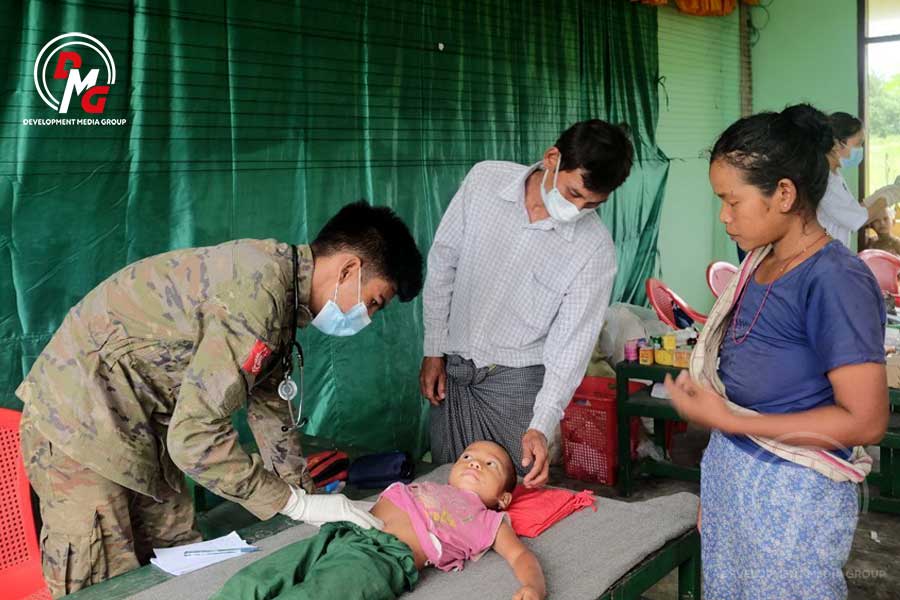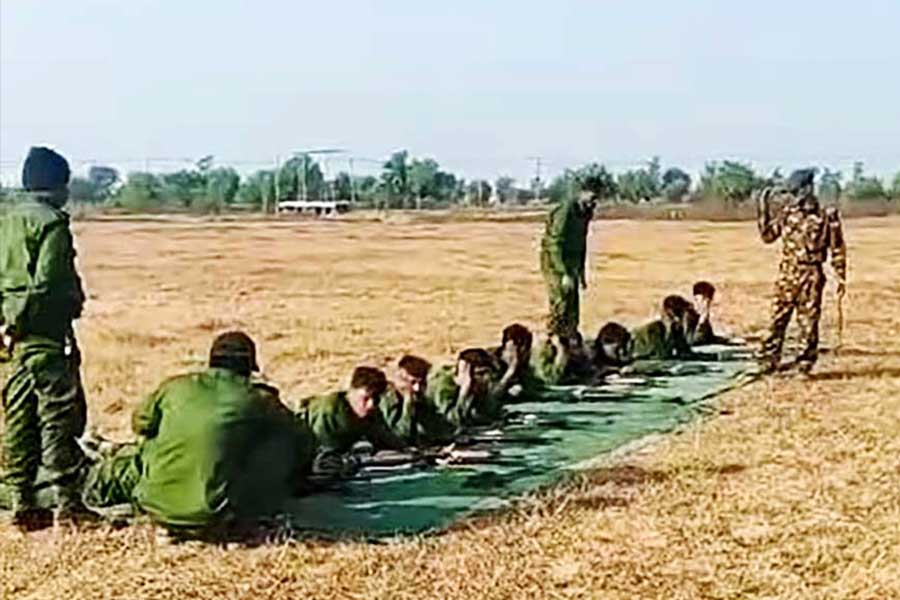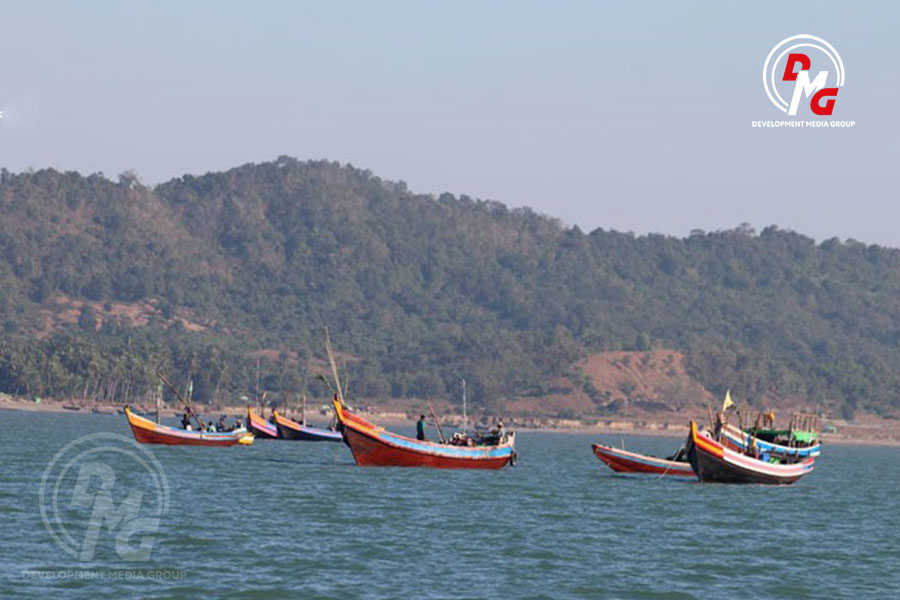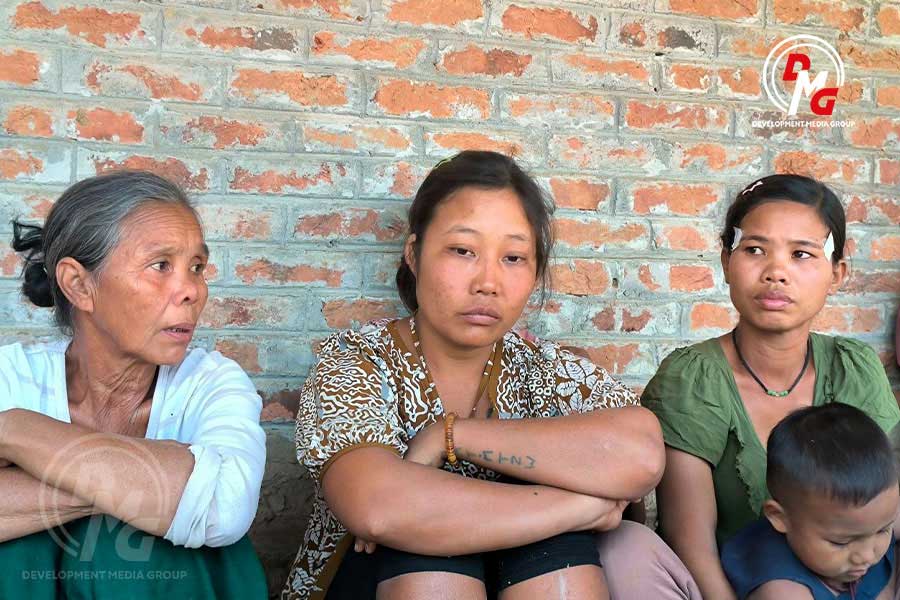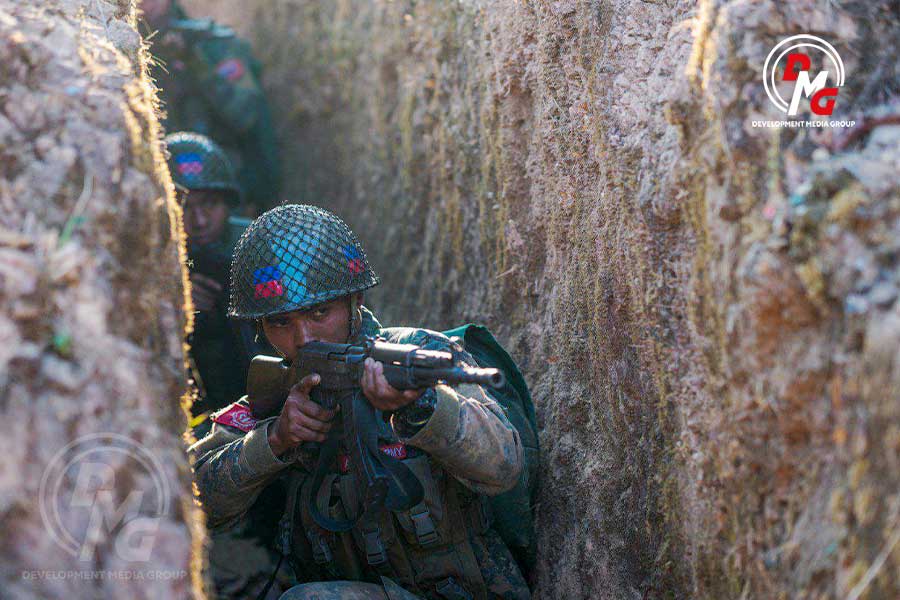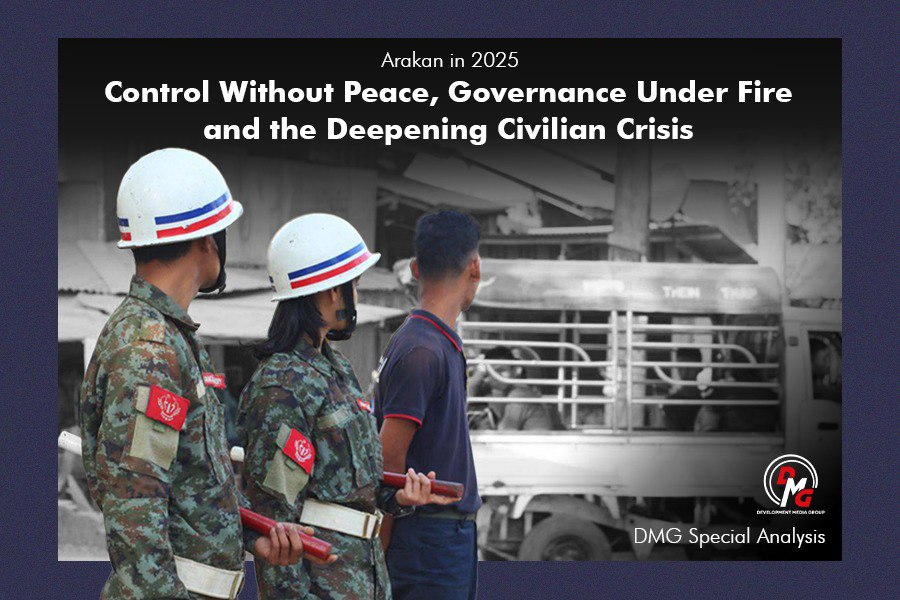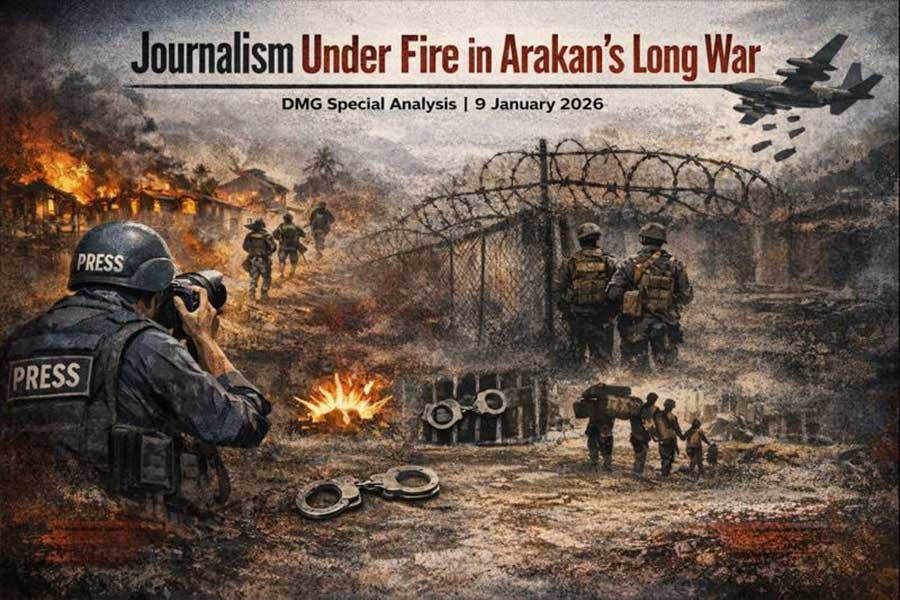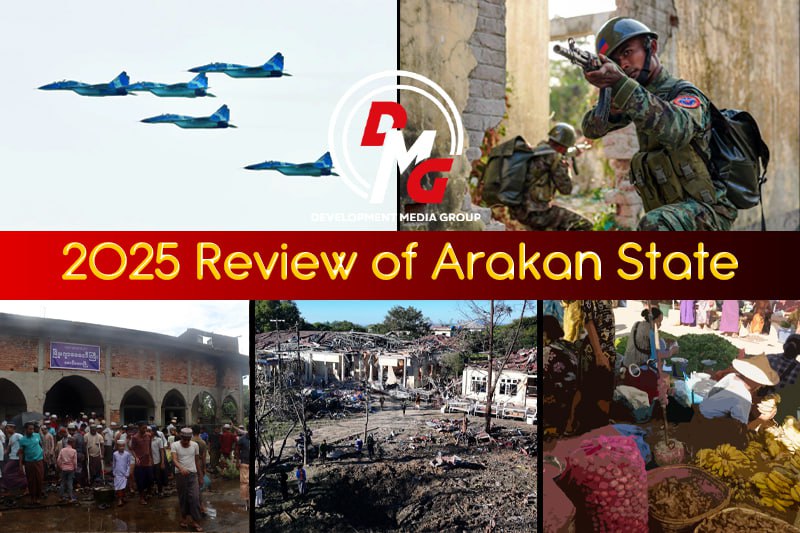- Children in Arakan State face rising cases of pneumonia and flu
- Muslim militiamen flee junta camps in Sittwe amid oppression, discrimination
- Junta navy activities halt fishing in Thandwe
- Junta airstrike kills 21 POWs, family members at Kyauktaw detention centre
- Arakan Army seeks to expand territorial control in Sittwe
DMG journalists’ case gets new, more punitive dimension
The two reporters have been granted bail in the case brought under Section 66(d) of the Telecommunications Law, but with the more recently added second charge under Penal Code Section 505(a), the defendants are not able to apply for bail.
17 May 2021

DMG
17 May 2021, Sittwe
The Tatmadaw has opened lawsuits against two Development Media Group (DMG) reporters under Section 66(d) of the Telecommunications Law and Section 505(a) of the Penal Code. The former is a controversial defamation provision, while the latter covers incitement in broadly worded language that critics say is liable to be abused by authorities.
The two reporters have been granted bail in the case brought under Section 66(d) of the Telecommunications Law, but with the more recently added second charge under Penal Code Section 505(a), the defendants are not able to apply for bail.
Earlier this month, it was learned that the Sittwe Township Court had summoned the two reporters — female reporter Hnin Nwe and deputy Editor-in-Charge Ko Nay Win San — to face the charges being brought against them. Ko Zaw Zaw, DMG operations manager, explained the court’s summons of the two reporters, both of whom are currently in hiding.
“We applied for bail in the first case charged under Section 66(d). Bail was granted and set at K1.5 million for each of the accused. We decided to face the trial and posted bail. However, on the afternoon of May 10, the No. 2 police station told us that the Sittwe Township Court had summoned the two reporters to appear at the court on May 11,” Ko Zaw Zaw said.
“I went to the police station to see the summons from the court and found that it was a summons for a new case charged under Section 505(a),” he added.
“DMG covered a story on January 10 in which military personnel allegedly took 700 baskets of paddy owned by Marlar villagers in Kyauktaw Township while the villagers were fleeing their homes due to clashes. The Tatmadaw has charged the reporters over the story.”
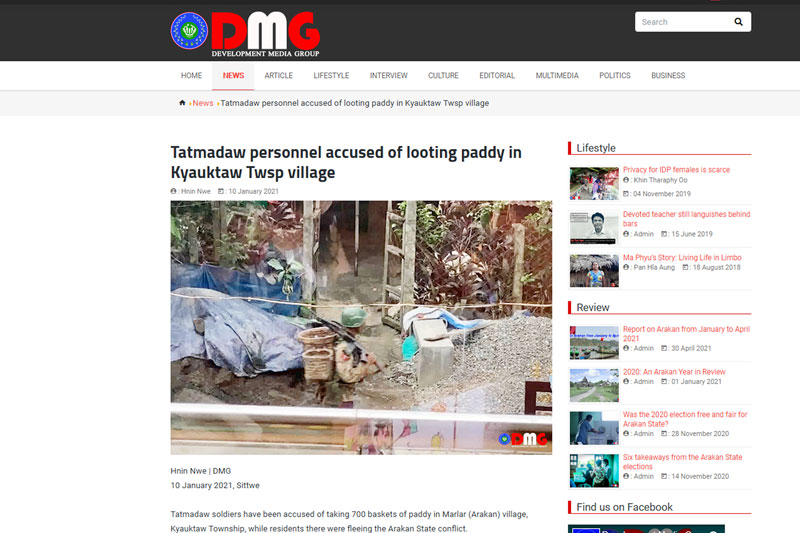
With Major Phone Myint Kyaw from No. 868 Military Police Company in Sittwe as plaintiff, a case was opened against Hnin Nwe and Ko Nay Win San on January 22.
Ko Zaw Zaw Tun, secretary of the Rakhine Ethnics Congress, said the Tatmadaw charges journalists because it wants to effectuate a news blackout, with the intention of keeping the public in the dark as to what is happening on the ground.
“We understand the challenges of journalists in armed conflict areas. Additionally, they cover stories referring to the comments of residents. If a journalist receives information from a resident, the journalist seeks to investigate the information from all sides concerned in order to cover the story,” he said.
U Pe Than, a member of the Arakan National Party’s Steering Committee for Policy Affairs, said that when the Tatmadaw charges journalists under such statutes, it amounts to blocking freedom of information and threatening journalists.
“Residents said the Tatmadaw did it and the journalists covered it in the story,” he said of the alleged looting of the Marlar villagers’ paddy. “So, the Tatmadaw has charged the journalists for causing disaffection toward the Tatmadaw. At that time, a Pyithu Hluttaw MP said the information was correct. We can make an investigation on the ground into whether the information is correct or not.”
He added: “If a charge is brought against them even though the information is correct, it is a kind of pressure not to cover such a story.”
The result could be a chilling effect on journalists’ future reporting, U Pe Than warned.
“The government needs to help journalists not to have a feeling that they dare not cover or reveal the truth, or not to have doubts about whether true information should be covered or not,” he said.
DMG released a statement on January 25 calling on the Tatmadaw to withdraw the charge, to instead file a complaint through the Myanmar Press Council, and to respect the right to freedom of expression and the rights of journalists.
It also sent a letter to the Ministry of Border Affairs and Security on March 5 and asked Dr. Aung Kyaw Min, current chair of Arakan State Administration Council, to settle the charges against its two journalists. On March 24, Dr. Aung Kyaw Min said he would intervene in the case and signed an MoU with the two journalists.
U Hla Thein, information officer for the Arakan State Administration Council, said the case has been communicated to the Myanmar Press Council in order to resolve the lawsuit under Section 66(d) of the Telecommunications Law, but he said he was not aware of the charges under the Penal Code’s Section 505(a).
DMG asked a resident of Marlar “new” village, who asked for anonymity out of concern for his safety, if the Tatmadaw took the paddy from the village or not.
“I heard that some soldiers who were stationed on a mountain near Marlar village carried paddy with a farming truck three times on January 7 last year. The paddy totalled about 700 baskets. I was told by an owner of a rice mill from Marlar old village,” he said.
Major General Zaw Min Tun, chair of the Tatmadaw True News Information Team, told RFA that the Tatmadaw personnel did not take paddy owned by Marlar villagers.
U Aung Marm Oo, editor-in-chief of DMG, said the reporter covered the story considering the inherent news value in the villagers’ losses, but the story did not have intent to damage the dignity of the Tatmadaw.
Civil society organisations generally agree that if a story includes incorrect information, the news agency that publishes such a story must take responsibility for the error, but there is also widespread agreement that such cases in Myanmar should be resolved according to the News Media Law.
Instead, authorities are bringing far more punitive criminal charges. The maximum penalty for a conviction under Section 505(a) of the Penal Code is three years’ imprisonment and a fine.
Hnin Nwe and Ko Nay Win San became the third and fourth DMG journalists to face legal action in recent years.
On December 11, 2020, the Department of Roads and Bridges opened a lawsuit against Maungdaw-based DMG reporter Aung Kyaw Min under Section 66(d) of the Telecommunications Law.
And on May 1, 2019, Myanmar Special Branch Police opened a criminal case at Sittwe Myoma police station against U Aung Marm Oo under Section 17(2) of the Unlawful Associations Law. U Aung Marm Oo has been in hiding for more than two years.
“Media professionals must be prosecuted through the Myanmar Press Council. The media has a Media Law. Violations of the code of conduct should be punished via the Media Law. Journalists should be prosecuted under the Media Law,” U Aung Marm Oo has said, adding that the most recent multi-charge, multi-defendant lawsuit against DMG journalists threatens the public’s right to information and the press at large.




